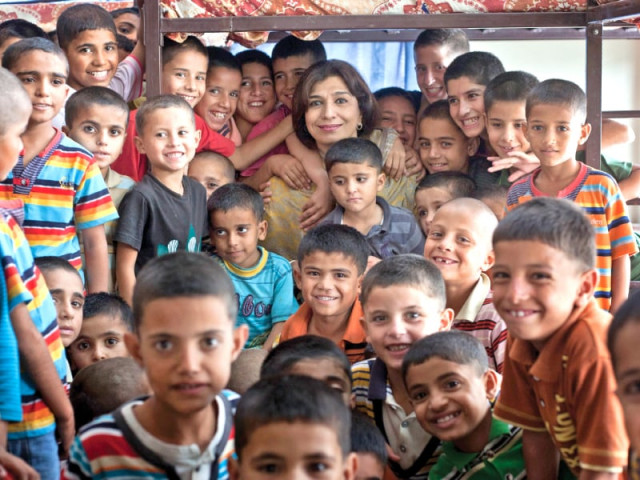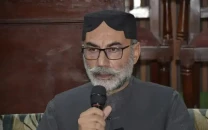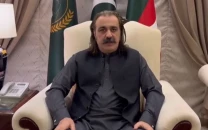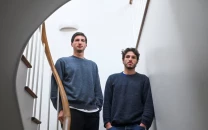World Humanitarian Day: A safe school, a safer home
Sonia Shahid, founder of the SSS, gives 100 displaced boys from all over the country the hope for a better future.

Boys pose for a photograph with Sonia Shahid. PHOTO: MYRA IQBAL/EXPRESS
“I want these boys to dream, to be motivated and become good men,” says Sonia Shahid, 52, with the content smile of a proud mother tugging at her mouth.
Her face lights up even more as she appears from behind a flight of stairs and pauses to absorb the animated faces cozied up on a rug in front of the television, alert eyes oscillating between a cricket match and a cartoon show.
Yes, Sonia is a mother – and not just to her own kids. With her children settled down continents apart, she has made room in her heart for 100 orphaned boys uprooted from their homes in areas that offered few – if any – prospects for a secure and healthy future. In this vein, she has opened the Sky School System (SSS) and an accompanying hostel in a two-portion house nestled within an upscale sector of the capital city.
Overcoming obstacles
Orphanages in Pakistan, and elsewhere, have long since been associated with the air of neglect. Sonia, however, is committed to changing this notion, not just with her doting, maternal authority but also with a strong focus on education.
“We need more well-educated people to invest in the future of our children,” she says, explaining that funding has been the least of the challenges she has faced in the past year since taking over from the Baitul Maal Sweet Homes.
According to Sonia, building a trustworthy and dedicated staff has been the toughest task, and perhaps also the most crucial. The SSS has eight teachers for grades KG to 3, an additional sports teacher, and nine caretakers who remain in the hostel after school hours to take care of the boys aged between 3 to 11 years.
Shaping young minds
For Ayesha Naveed, an experienced teacher now at SSS, the most rewarding experience of her career has been witnessing the growth of these children.
“It is incredible how much these boys have picked up in just a year,” she gushes. “These young boys have an incredible penchant for learning. Children who could barely understand conversational Urdu at one time can now express themselves through drawing, writing and speaking.”
Ayesha is right to be excited about such progress. These young orphans, who hail from diverse backgrounds, had little exposure to English, and even Urdu, prior to their arrival in Islamabad. Leaving behind the volatile terrains of Balochistan, Parachinar, Dera Bugti and villages on the outskirts of Punjab, the rosy-cheeked boys were exposed to a new world just last July.
Of love and hope
To Sonia, who has taken on the responsibility to give her adoptive children the best of everything, success comes in small strides.
After repeated exposure to the idea of hygiene, through the discipline of daily showering, hand washing before all meals, brushing teeth, and visits to the best doctors to monitor health, Sonia finally feels like change is in the offing.
“When they came back from their holidays this summer, their hygiene was impeccable. No skin conditions and sparkly white teeth,” she beams.
The school, neat and sparsely furnished, is covered with illustrations and photographs on the walls, reflecting the discipline and welcoming simplicity of the school-cum-orphanage. After school hours, the boys play in the fenced park across the road, tire themselves out, and then curl into their bunked beds for a goodnight’s sleep.
“We don’t want these boys to ever feel like they are less than anybody,” says Sonia, a definite firmness in her voice. “I gave my own children the best of everything, and I will do the same for these boys.”
Published in The Express Tribune, August 19th, 2013.



















COMMENTS
Comments are moderated and generally will be posted if they are on-topic and not abusive.
For more information, please see our Comments FAQ